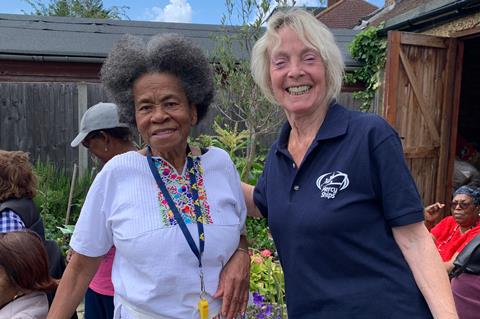Enid Cork arrived in the UK from Jamaica aged 17 and hit the ground running. She hasn’t stopped, and here shares from her full life
I was born on 1 January 1944, in St Elizabeth, Jamaica, to Anna and Samuel Sherman. As a sickly child, I was sent to live with my uncle Papi and his family, where my health improved. My school and church were nearby, and I enjoyed running up the hill to attend both.
My favourite subject in school was English, and I enjoyed Sunday school and choir practice. I was confirmed at St Stephen’s Anglican Church in Nain, aged 14, and became a godmother to a neighbour’s daughter.
When I finished my Jamaica Local Examinations and graduated, my dad asked me whether I was interested in going to England. I said “Yes”. So, in April 1961, aged 17, I left Jamaica to come to London.
Adjusting to life in London
My flight landed at Heathrow in the afternoon, and my brother was meant to come and meet me. But I didn’t see him, so I shared a black taxi with some fellow passengers. My share of the fare was seven shillings to Kensal Rise in northwest London, where my brother lived. He was about to leave to meet me when I arrived!
Adapting to my new surroundings was like a roller coaster ride. I cried a few times but then said to myself that there was no going back and I had to cope with it.
The week I arrived, I took a job in a hospital laundry, where the mainly English women were very supportive. In my first two years, I kept busy exploring museums, Kew Gardens, Madame Tussaud’s, St Paul’s Cathedral, as well as making friends and attending All Soul’s Church in Harlesden.

Marriage and career
It was during this time that I met my husband Linton Cork, we got married and not long after my son Worrell was born. We lived with my husband’s sister and her family for some time and then eventually bought our own home with a mortgage from the Greater London Council in January 1967.
I became active in local community initiatives in the late 1970s, serving as a member of my residents’ association and acting as a road steward. My role involved collecting 50p annually from neighbours and raising their concerns with MPs and councillors.
You must not give up on what is unjust and [you must] fight for what is rightfully yours
In 1969 I trained at Neasden and Willesden Hospital to be a general nurse and in 1972 did a postgraduate diploma in ophthalmic nursing at the Western Ophthalmic Hospital in Marylebone. After that training, I was headhunted by a matron at Neasden Hospital to join them in the Ophthalmic Unit.
I enjoyed my time there, but I realised I was taking on extra responsibilities without proper pay. I spoke with the nursing sister, who arranged for me to meet with the matron. After explaining all my additional duties, matron decided to offer me the senior post with a higher salary.
I stayed at Neasden Hospital until the unit closed in 1976. We moved temporarily to Northwick Park and then permanently in 1977 to Central Middlesex Hospital.
In 1982, I visited my father in Jamaica and, moved by a sermon on forgiveness at the Moravian church, felt called to greater commitment. Returning to London, I began attending St Michael’s Church, which was very active in evangelism and attracted many new members from St Raphael’s estate.
In 1988, the government introduced clinical grading. Many nurses, including a lot of Black nurses, did not receive promotions. I was a union member and served as a shop steward, representing nurses in their efforts to get higher grades. Some succeeded and some did not. Despite being a union representative, I was not promoted. Because of this, I left Central Middlesex Hospital. While working at another hospital, I learned that the clinical grading was being reviewed. The union became involved again, and I appealed the original decision at the highest level – and won. I was upgraded and received back pay for the years I should have been at the higher grade. Fellow nurses often asked me how I achieved this, and I would tell them: “You must not give up on what is unjust and fight for what is rightfully yours.”
The losses and gains of life
I have always been guided by my faith, which led me to start the journey towards becoming a licensed lay minister in the Church of England. However, nothing is plain sailing, and I had to put training on hold because Linton sadly died in 1993.
I was eventually licensed at St James’ Alperton on 11 November 1995. From the time I joined St Michael’s Church, I had been involved in every area of lay ministry – I served as a Sacristan, opening the church and preparing the altar, pulpit and sanctuary for all liturgies. I led the Sunday school for ten years with the help of a dedicated team. I served on the Parochial Church Council, and was a representative on the Willesden Area Synod, Willesden Area Bishop’s Council and the London Diocesan Synod. As a member of both synods, I would update the congregation and write reports in the church magazine. I was also a founding member of the Black Anglican Concerns Group. I visited local churches and would ask to speak for five minutes, encouraging people of colour to attend the meetings, share their concerns and learn how they could take part in all forms of church ministry.
I have completed several courses, including Skilled Helper in Counselling at Harrow College and Bereavement Counselling. These studies have enabled me to listen more intensely and guide people in a professional manner. In 1996 I started a house group, which continued until 2015. We shared some glorious times together, reading the scriptures and meditating upon them. I also arranged weekends away for the group.
By the time I retired in 2005, I was a theatre sister in ophthalmic surgery at Watford General Hospital, heading a team of five consultants and six nurses. Looking back over my long and rewarding career, I can say I enjoyed my nursing to the fullest level. I had some challenges, and I had to be quite proactive and resilient to gain what I had achieved.

New adventures
Retirement was just the beginning of a busy new chapter for me, and it continues to be so. Shortly after retiring, I went to Ghana to volunteer for Mercy Ships. I had supported them for many years before spending two months on the Anastasia, a hospital ship.
Working on the Anastasia was challenging because I wasn’t fully briefed in the UK before I left, as they were desperate for experienced theatre nurses. So I hit the ground running and had to quickly adapt during orientation – working in the theatre and outpatients clinic, I joined the worship group and on days off visited nearby villages. I enjoyed socialising and meeting a variety of people, especially over lunch and dinner with people of various nationalities. I would often join the surgeon when patients returned for check-ups. They were always overjoyed and grateful to have their sight back after many years of not seeing due to cataracts.
I loved this unique experience, and I continue to fundraise for Mercy Ships. My garden parties are legendary and raise a lot of money for the charity, which means a great deal to me.
I have never stopped being active during retirement. I was inspired by seeing people swimming on their days off in Ghana, so, when I returned home, I signed up for swimming lessons and haven’t looked back. I go at least four times a week and swim 20 lengths with ease. I am a regular at the gym and do Pilates and yoga three times a week as well as body conditioning. After some falls in the last couple of years, I was told that had I not been doing yoga, I would have broken my bones. Yoga and Pilates have kept me fit and supple, as well as my gardening.
I have taken numerous courses during my retirement, including IT for older people. I have also travelled the world. The question people ask me is: what country have I not visited?
I am grateful, first and foremost, to the Lord for my long and happy life. Despite the ups and downs, I have always tried to be an encourager, a mentor, a role model and an example and inspiration to my community, friends and family over the years.
My favourite Bible verse is Jeremiah 29:11: “‘For I know the plans I have for you,’ declares the LORD, ‘plans to prosper you and not to harm you, plans to give you hope and a future.’” God already has plans for us, but sometimes he calls us directly to walk out his plans. We should also remember that we should prayerfully put ourselves forward under his guidance. mercyships.org.uk
Words by Sophia Jones





























No comments yet